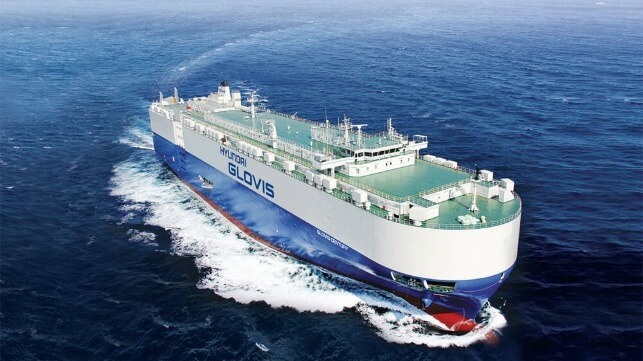Tesla Buyers Left Waiting as Australia Sends “Biohazard” PCTC Back to China

Buyers of Tesla’s electric vehicles in Australia have been expressing their frustrations online as they have been left waiting for a car carrier transporting their vehicles to reach port. The consumers have become experts at tracking the movement of the Pure Car and Truck Carrier (PCTC) Glovis Caravel (20,400 dwt) which can transport approximately 6,500 vehicles as it has made repeated approaches to Australia but now is on its way back to China.
Having made their car purchases as early as August, some buyers are saying online they had been given an anticipated delivery date of October only to have it delayed some said twice. One says they have now been told to expect their car sometime before the end of January, or possibly they will receive an alternate vehicle. One buyer writes they just got a reassigned, different VIN for their vehicle. While there is no official explanation, speculation centers on the dreaded Chinese “stink bug” or some equally invasive insect as causing the problem.
An Australian reporter for the Daily Mail writes they saw an email informing buyers that the ship was being sent back to Shanghai for “further processing prior to re-entering an Australian port.” The newspaper writes that buyers are being told that Australia’s Department of Agriculture, Fisheries and Forestry refused the vessel permission to continue its deliveries due to a biohazard.
Australia has some of the strictest rules and enforcement designed to prevent non-native species and invasive pests from entering the country. Pests hitching a ride or insects laying eggs on containers or other shipboard structures is a well-known problem with authorities around the world regularly inspecting ships and arriving cargo.
AIS data shows the Glovis Caravel, registered in Panama, arrived at Brisbane, Australia at the end of October after a month’s voyage from China. She docked in Brisbane twice, once in mid-November and a second time at the end of the month. Most of the time the vessel however was being held offshore with buyers looking wantingly at the position data while the newspaper reports the crew was attempting to fumigate the vessel.
The Glovis Caravel departed Australia early in December and now shows she will be arriving back in China early next week. It is unclear if they were able to unload some vehicles in Brisbane, but port calls in Melbourne and Port Kembla were canceled with the product scheduled for delivery to those ports taken back to China.

that matters most
Get the latest maritime news delivered to your inbox daily.
According to the Daily Mail, this is not the first time a “biohazard” has delayed the delivery of Tesla vehicles. The news outlet says a year ago another vessel had a similar issue with the deliveries being delayed from late December into February 2023.
It is not the first time this car carrier which is part of a fleet of 80 ships operated by Hyundai Glovis has had problems with an infestation of insects. Arriving in Auckland, New Zealand in February 2018, an inspection before the Glovis Caravel docked turned up 600 stink bugs with at least a dozen of the noxious insects still alive. Despite the fact the vessel was sealed, New Zealand authorities ordered it to depart for fumigation before it would be permitted to dock. Officials told reporters at the time it was the fourth cargo ship they had sent away in recent weeks due to an infestation of invasive insects hitching a ride along the vessel’s cargo.
